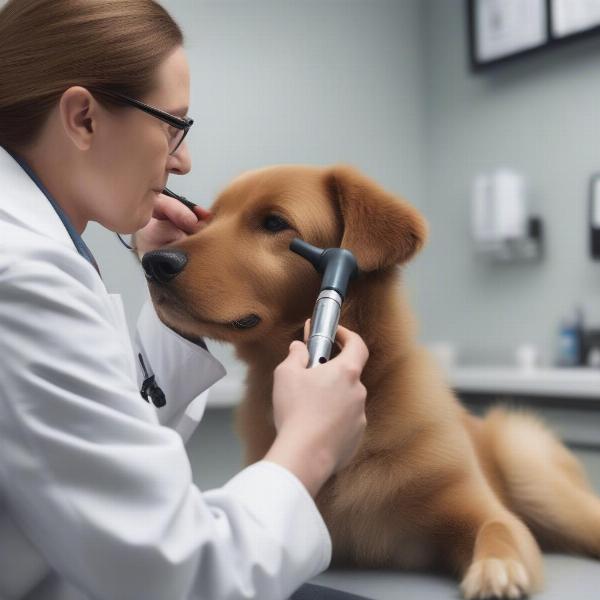Blood in your dog’s ear can be alarming, but it’s essential to stay calm and understand the potential reasons behind it. This article will explore the common causes of blood in a dog’s ear, how it’s diagnosed, and the available treatment options. Understanding these factors is crucial for ensuring your furry friend receives the appropriate care.
Why is There Blood in My Dog’s Ear?
Several factors can lead to blood in a dog’s ear. Ear infections are a frequent culprit, often accompanied by inflammation and discomfort. Ear mites, tiny parasites that infest the ear canal, can also cause bleeding due to intense itching and scratching. Trauma to the ear, such as a bite wound or foreign object lodged inside, can also result in bleeding. In some cases, blood in the ear can indicate a more serious underlying condition, such as a blood clotting disorder or a tumor.
Diagnosing the Cause of Blood in Your Dog’s Ear
If you notice blood in your dog’s ear, it’s vital to seek veterinary attention. The vet will conduct a thorough examination of your dog’s ear, which may involve using an otoscope to visualize the ear canal. They may also take a sample of any discharge or debris present to analyze for infection or parasites. Depending on the suspected cause, further diagnostic tests, such as blood tests or X-rays, might be necessary to rule out underlying conditions.
Treatment Options for Blood in a Dog’s Ear
Treatment for blood in a dog’s ear depends on the underlying cause. For ear infections, antibiotics or antifungal medications are typically prescribed. Ear mites are treated with specific anti-parasitic medications. If a foreign object is present, the vet will carefully remove it. In cases of trauma, the wound will be cleaned and treated appropriately. If a more serious condition is diagnosed, such as a tumor, further specialized treatment may be required.
 Veterinarian examining dog's ear
Veterinarian examining dog's ear
Home Care for a Dog with Blood in the Ear
While veterinary care is essential, you can also take some steps at home to support your dog’s recovery. Keep the affected ear clean and dry, and prevent your dog from scratching or further irritating the area. Your vet might recommend using a cleaning solution or ear drops. It’s crucial to follow your vet’s instructions carefully and complete the full course of any prescribed medications.
Can I clean my dog’s ear if it’s bleeding?
Cleaning your dog’s ear while it’s bleeding can be harmful. It’s best to consult your veterinarian first for guidance on proper cleaning techniques. They may advise against cleaning the ear until the bleeding has stopped or recommend a specific cleaning solution to avoid further irritation.
Conclusion
Blood in a dog’s ear can be a sign of various issues, ranging from minor infections to more serious conditions. Prompt veterinary attention is crucial for accurate diagnosis and appropriate treatment. By understanding the potential causes, diagnostic procedures, and treatment options, you can play an active role in ensuring your dog’s ear health and overall well-being. Remember to follow your vet’s recommendations carefully and prioritize preventative care to minimize the risk of future ear problems.
FAQ
- What should I do if my dog is constantly shaking its head? Frequent head shaking can be a sign of ear discomfort, possibly due to infection, mites, or a foreign object. Consult your veterinarian.
- Can I use human ear drops on my dog? Never use human ear drops on your dog without consulting your vet. They can be harmful.
- How can I prevent ear infections in my dog? Regular ear cleaning with veterinarian-approved solutions can help prevent infections.
- Are certain dog breeds more prone to ear problems? Yes, breeds with floppy ears or excessive hair in the ear canal are more susceptible.
- When should I take my dog to the vet for ear issues? Any signs of blood, discharge, odor, redness, swelling, or excessive scratching warrant a vet visit.
- Can allergies cause blood in a dog’s ear? Yes, allergies can lead to inflammation and scratching, potentially resulting in bleeding.
- How long does it take for an ear infection to heal? Healing time varies depending on the severity and cause of the infection, typically 1-2 weeks with appropriate treatment.
Related Articles:
About ILM Dog:
ILM Dog is your trusted resource for expert advice on dog care, offering guidance on breeds, health, training, nutrition, grooming, and more. Whether you’re a new dog owner or a seasoned expert, we provide evidence-based information and practical tips to help you provide the best possible care for your canine companion. tail protection for dogs Discover a wealth of resources and connect with our community of dog lovers worldwide. Contact us at [email protected] or +44 20-3965-8624 for personalized advice.